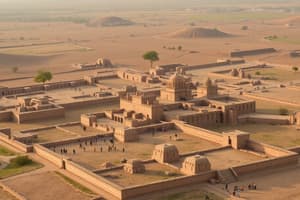Podcast
Questions and Answers
What is the distinctive artifact of the Harappan civilization?
What is the distinctive artifact of the Harappan civilization?
Harappan seal
Which of the following periods is considered the early phase of the Harappan civilization?
Which of the following periods is considered the early phase of the Harappan civilization?
- Early Harappan (6000 BCE-2600 BCE) (correct)
- Decadent phase (1300 BCE onward)
- Mature Harappan (2600 BCE-1900 BCE)
- Late Harappan (1900 BCE-1300 BCE)
What is the time span of the Harappan civilization?
What is the time span of the Harappan civilization?
6000 BCE to 1300 BCE
The Harappan civilization is also known as the Indus Valley Civilization.
The Harappan civilization is also known as the Indus Valley Civilization.
During which phase did the Harappan civilization experience the most prosperity?
During which phase did the Harappan civilization experience the most prosperity?
What materials are known specifically to belong to the Harappan civilization?
What materials are known specifically to belong to the Harappan civilization?
What does the term 'Harappa' refer to?
What does the term 'Harappa' refer to?
Flashcards are hidden until you start studying
Study Notes
The Harappan Civilization
- The Harappan seal, a key artifact, is made of steatite and features animal motifs along with undeciphered script.
- Archaeological evidence such as houses, pots, ornaments, tools, and seals provides insights into Harappan life.
- The civilization is also known as the Indus Valley Civilization, named after the site of Harappa where it was first identified.
- The time span of the Harappan Civilization ranges from 6000 BCE to 1300 BCE.
- The Early Harappan phase lasted from 6000 BCE to 2600 BCE and serves as the civilization's formative period.
- The Mature Harappan phase, from 2600 BCE to 1900 BCE, marks the civilization's peak prosperity.
- The decline phase, known as Late Harappan, occurred from 1900 BCE to 1300 BCE.
- Distinctive artifacts of the Harappan Civilization include pottery, baked and unbaked bricks, seals, weights, beads, and copper and bronze articles.
- These artifacts have been discovered in a wide geographical area including Afghanistan, Baluchistan, Sind, Punjab (Pakistan), and Indian states like Jammu and Kashmir, Punjab, Haryana, Rajasthan, Uttar Pradesh, Gujarat, and Maharashtra.
Studying That Suits You
Use AI to generate personalized quizzes and flashcards to suit your learning preferences.




